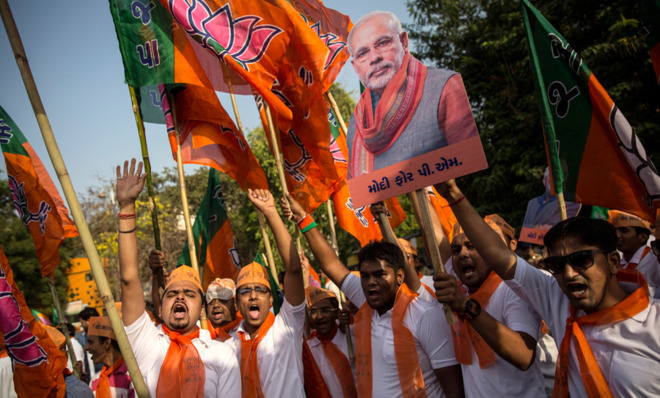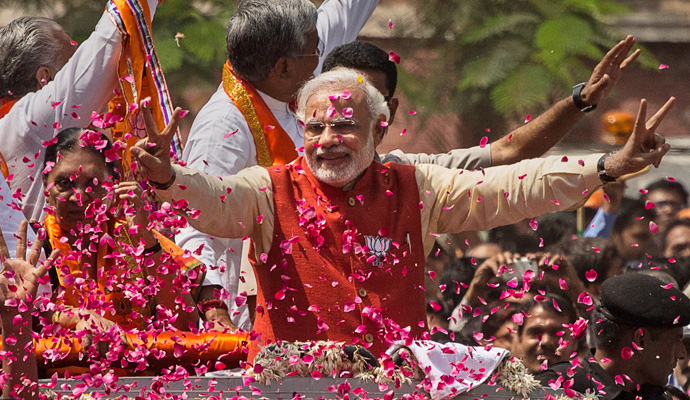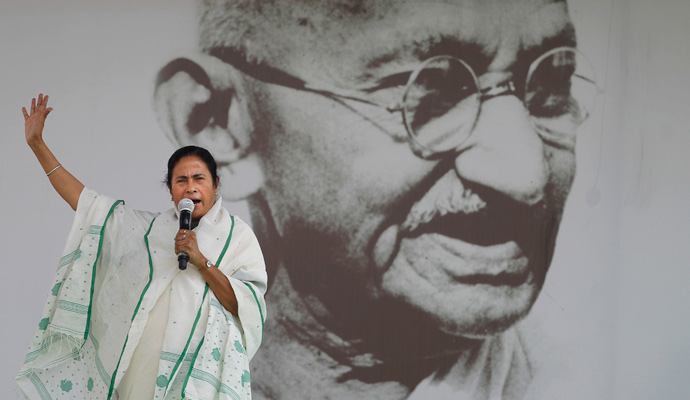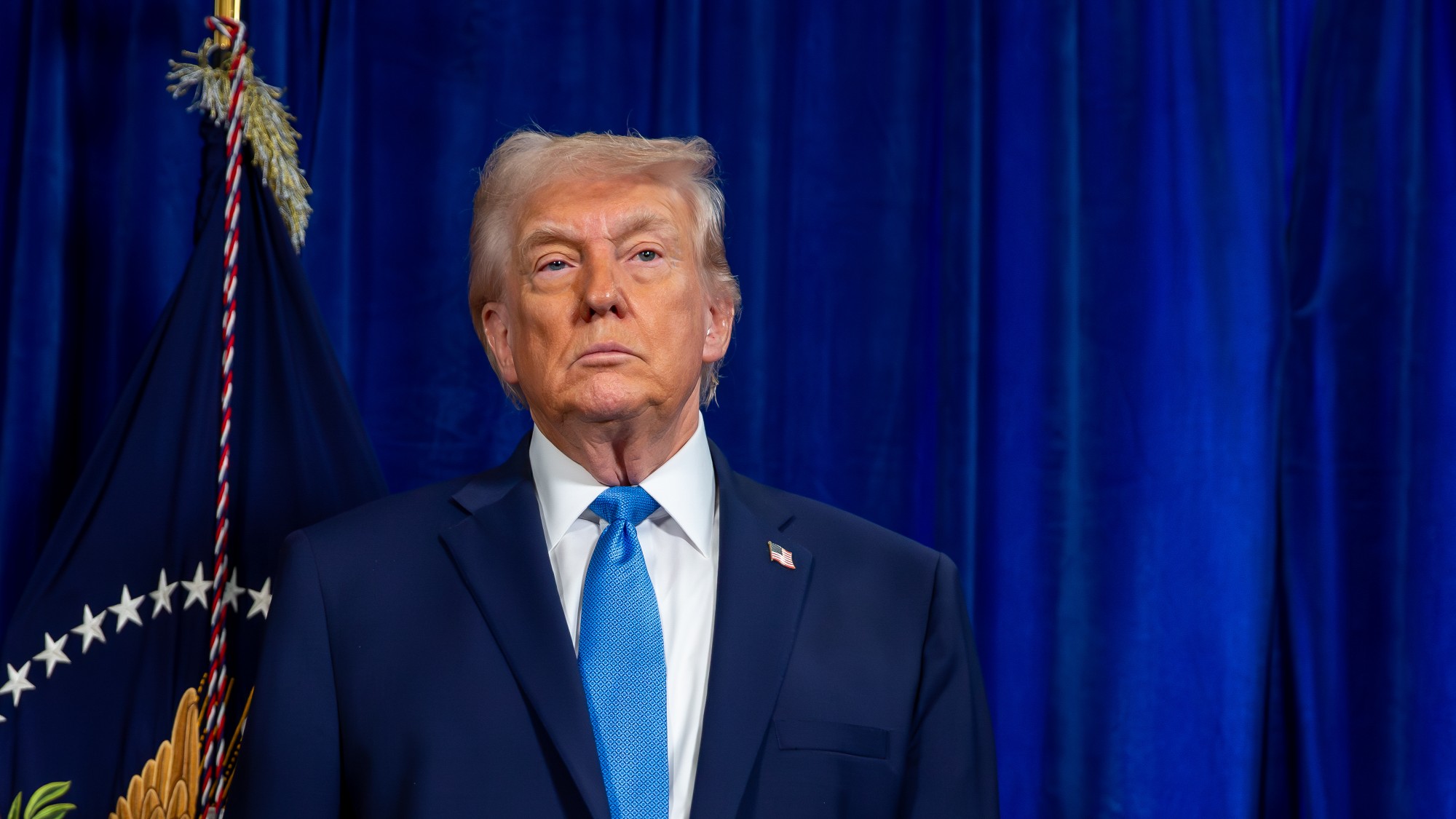Why Narendra Modi is not a shoo-in to become India's next prime minister
The most likely outcome of India's elections is unmitigated chaos

A free daily email with the biggest news stories of the day – and the best features from TheWeek.com
You are now subscribed
Your newsletter sign-up was successful

NEW DELHI, India — Foreign investors seem confident that Narendra Modi will become India's next prime minister in the elections that began April 7.
They've shown their approval by pouring about $4.4 billion into India since March — roughly around when Modi's Bharatiya Janata Party (BJP) began stretching its poll lead over the ruling Congress party.
Indian investors, however, see things differently. They have been selling local stocks, and not because they're bearish about how Modi would steer the economy.
The Week
Escape your echo chamber. Get the facts behind the news, plus analysis from multiple perspectives.

Sign up for The Week's Free Newsletters
From our morning news briefing to a weekly Good News Newsletter, get the best of The Week delivered directly to your inbox.
From our morning news briefing to a weekly Good News Newsletter, get the best of The Week delivered directly to your inbox.
On the contrary, the controversial politician has become wildly popular by blending charismatic Hindu nationalism with a strong pro-business reputation.
But local investors — who are more steeped in the complexities of India's freewheeling democracy — are less convinced that the 63-year-old chief minister of Gujarat will actually get the chance to introduce the sort of reforms that he and they want.
In spite of the much-hyped "Modi wave" sweeping India, the reality is that the BJP leader may have a hard time becoming prime minister. He will almost certainly need the support of other parties. And there's good reason to believe that support will elude him.
The latest polls suggest the BJP and its close allies would get about 38 percent of the vote — enough for between 234 to 246 seats in the Lok Sabha, India's lower house of Parliament.
A free daily email with the biggest news stories of the day – and the best features from TheWeek.com
That may mean a record number of seats for the BJP, but still not enough to reach a majority, which takes 272.
So anyone banking on Modi running India may be wary of waking up on May 16, when the results of the multi-week polls are announced, to discover that India is a long way from forming a government.

"The central bank is braced for a rough ride, whatever happens," stock market expert Devangshu Datta wrote in the Business Standard. "If Parliament is hung, there could be a rupee crash, if [foreign institutional investors] exit in droves."
For some, the situation feels similar to 1996, when the BJP had its first stab at taking power. Only after three years of politicking were they able to form a stable government.
In the 1996 general election, the BJP won 161 seats and had few political allies. The BJP leader, Atal Bihari Vajpayee, tried to form a government but failed to get the support of regional parties. He resigned after 13 days.
Then a coalition of 13 small regional parties formed a government, propped up by the Congress party. The coalition governed by consensus, and managed some economic reforms, but the prime minister's position was unstable. Two were ousted by Congress over policy disagreements.
Fresh elections were held after two years of instability. The BJP cobbled together a slender majority in 1998 after winning 182 seats, the total Modi aims to beat. But Vajpayee needed another round of elections in 1999 to form a lasting government. The BJP won the same number of seats but Vajpayee had built solid alliances with several regional parties.
The difference this time, according to Modi's biographer, Nilanjan Mukhopadhyay, is that Modi is temperamentally unsuited to the task of building a coalition.
"Modi is not able to work with other people to form coalitions. He can force people to come to him, but he can't seek someone else's hand. He is too much of an egotist."
Mukhopadhyay asked Modi in 2012 how he would approach the issue of building a coalition. "He said, 'There was a time when we had no problem finding allies because we kept winning seats. When we stopped winning seats, so our allies started deserting us.'"
Ironically, winning too many seats in the wrong places might ultimately kill off Modi's bid to become prime minister.
Three eastern states are key to the election: Odisha, West Bengal, and Tamil Nadu, where a total of 102 seats are on offer. These states are roughly equivalent in importance to Ohio, California, and Florida in the U.S. presidential race. The BJP has a negligible presence in these states, but the local parties are bullish about their prospects for 2014.
Each of the chief ministers of these states is a potential coalition partner, and each of them is taking the "Modi wave" very seriously.
"If the regional players start to look at the BJP as a threat to their own base then there's no way they will support them in government," Mukhopadhyay said.

According to right-wing commentator Swapan Dasgupta, the signs are not at all promising for Modi in West Bengal, where Chief Minister Mamata Banerjee has gone on the attack against the BJP.
Kollywood to the rescue
But Modi may find support from movie star-turned-politician Jayalalithaa Jayaram, who is Tamil Nadu's chief minister and who has a friendly personal relationship with Modi.
"There is a gentle Modi breeze blowing in Tamil Nadu," Dasgupta wrote in his NDTV column. "Jayalalithaa is seeking to appropriate some of it in constituencies where the BJP is not contesting — and these make up most of the seats."
If that weren't hard enough to predict, there remains the wild card of the Aam Aadmi Party, the anti-corruption party formed in November 2012 that swept its leader, Arvind Kejriwal, to power in the capital of New Delhi.
Kejriwal is competing directly with Modi for the seat of the holy city of Varanasi, and the fledgling party has fielded more candidates than either the BJP or Congress.
"If we find on May 16 that Aam Aadmi Party has 50 to 60 seats, Kejriwal is the next prime minister," Mukhopadhyay said. "That would mean the BJP would not get more than 150. Modi could not survive that."
This article, by James Tapper, originally appeared at GlobalPost.
More from GlobalPost...
-
 Touring the vineyards of southern Bolivia
Touring the vineyards of southern BoliviaThe Week Recommends Strongly reminiscent of Andalusia, these vineyards cut deep into the country’s southwest
-
 American empire: a history of US imperial expansion
American empire: a history of US imperial expansionDonald Trump’s 21st century take on the Monroe Doctrine harks back to an earlier era of US interference in Latin America
-
 Elon Musk’s starry mega-merger
Elon Musk’s starry mega-mergerTalking Point SpaceX founder is promising investors a rocket trip to the future – and a sprawling conglomerate to boot
-
 The billionaires’ wealth tax: a catastrophe for California?
The billionaires’ wealth tax: a catastrophe for California?Talking Point Peter Thiel and Larry Page preparing to change state residency
-
 Bari Weiss’ ‘60 Minutes’ scandal is about more than one report
Bari Weiss’ ‘60 Minutes’ scandal is about more than one reportIN THE SPOTLIGHT By blocking an approved segment on a controversial prison holding US deportees in El Salvador, the editor-in-chief of CBS News has become the main story
-
 Has Zohran Mamdani shown the Democrats how to win again?
Has Zohran Mamdani shown the Democrats how to win again?Today’s Big Question New York City mayoral election touted as victory for left-wing populists but moderate centrist wins elsewhere present more complex path for Democratic Party
-
 Millions turn out for anti-Trump ‘No Kings’ rallies
Millions turn out for anti-Trump ‘No Kings’ ralliesSpeed Read An estimated 7 million people participated, 2 million more than at the first ‘No Kings’ protest in June
-
 Ghislaine Maxwell: angling for a Trump pardon
Ghislaine Maxwell: angling for a Trump pardonTalking Point Convicted sex trafficker's testimony could shed new light on president's links to Jeffrey Epstein
-
 The last words and final moments of 40 presidents
The last words and final moments of 40 presidentsThe Explainer Some are eloquent quotes worthy of the holders of the highest office in the nation, and others... aren't
-
 The JFK files: the truth at last?
The JFK files: the truth at last?In The Spotlight More than 64,000 previously classified documents relating the 1963 assassination of John F. Kennedy have been released by the Trump administration
-
 'Seriously, not literally': how should the world take Donald Trump?
'Seriously, not literally': how should the world take Donald Trump?Today's big question White House rhetoric and reality look likely to become increasingly blurred